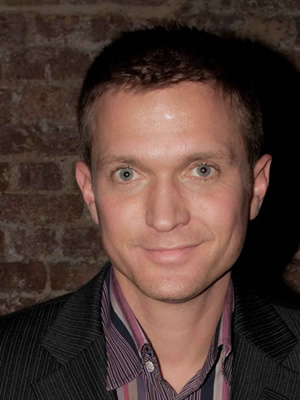Interview with Adam Bromley
Tuesday 12th April 2011

An interview with freelance producer, director and comedy writer Adam Bromley. Adam is one of the Script Editors working on The Sitcom Mission 2011...
Hi Adam. What's your background and why did you want to go into comedy?
I am an overeducated, underachieving know-it-all whose contemporaries from school earn more than him. Comedy helps with the gnawing sense of doubt and self-loathing.
You've worked on a number of TV sitcom pilots in the past. What is it about TV sitcom that you love, and is there anything that frustrates you about it?
TV sitcom when it's really good is the best television you can watch. I can remember laughing so hard at an episode of Blackadder the Third that I kicked a tray of food and drink across the room (it's the one where Blackadder and George swap roles, Wellington then repeatedly kicks Prince George across the room.) What other form of entertainment makes you trash your own home in a positive way?
The frustrations of the current TV comedy world are legion, not least that some people working in commissioning have no sense of humour. They wish they were funny, instead they work in commissioning to be around funny people. It's a shame that they chose to work in comedy rather than local government where they would be more at home.
Which sitcom do you wish you'd worked on and why?
I wish I had worked on I'm Alan Partridge, preferably in some responsible role rather than 2nd unit paper-clip organiser. The reason is pretty simple, so that I could tell people I had worked on I'm Alan Partridge. No, obviously, because it's my favourite comedy series and it would be a privilege to work on such an outstanding piece of TV.
You've produced a lot of radio sitcom, including Hut 33, Double Science, The Party Line and Think The Unthinkable. Apart from budget, what's the biggest difference between TV and Radio?
Radio sitcom works best with more plot than a TV sitcom. There's lots of comedy you can't do on the radio, funny looks, embarrassing moments, slapstick and physical gags work poorly. But you can put in more action than would be practical in a TV show, the dialogue riffs are able to run longer, verbal gags sustain more complexity and it's possible to get away with more heightened characters and situations than would be practical in TV. The main change in recent years is that TV does less and less audience sitcom, moving towards stylised, low-key single camera work; whereas audience sitcom continues to work well on radio, although radio comedy too seems to be going in the same direction. Hopefully the success of Miranda Hart on BBC2 will remind everyone in both TV and radio that audiences love belly laughs and not to worry too much about the opinions of miserable critics in the broadsheets.
What do you look for when seeing a new script or comedian for the first time?
It is very easy to intellectualise comedy and forget that at its most fundamental, comedy is about making others laugh. When looking for promising writing and performing talent, gut instinct is the best guide. For me the things to mark out promising talent are a combination of originality and ability to get laughs. Of course plenty of hack stand-ups will get a room laughing by a identikit material which points out that men and woman see the world differently, we do silly things when we are drunk and other countries are not the same as the UK. But if you find that funny, despite the fact that a version of that routine has been in existence for decades, then you should probably see more comedy. I have to go with my own instincts; that's really what it boils down to. I reckon they are right about 70% of the time, which seems to work as the basis of a career.
What's been your biggest mistake or failure in the past and how has it helped you in the long run?
One of my biggest failures was to leave my staff job at the BBC for a freelance contract and get sacked 3 weeks into the job. Although it was traumatic at the time, it prompted me to get working on my feature film script which has since been optioned by two producers. Having to suddenly find new work prompted me to make a load of new contacts and really expand my CV. I had probably been at the BBC too long and the gig was straight in at the deep end. In fairness to the production company, they made the right call; there wasn't a productive role for me in the show, which went on to be very successful. There are many things I've learned from that experience, not least that being a jobbing producer on someone else's show is a difficult role to get right.
What three pieces of advice would you give to an aspiring writer?
a) You have to put the hours in. Writing requires patience and commitment.
b) Be honest with yourself. If you're getting nowhere after a couple of years, then you're probably not going to make it.
c) Writing is rewriting, so you have to become your own Script Editor. Splurge it out, then polish and make it as funny as it possibly can be. Keep improving it. No script is ever finished.

